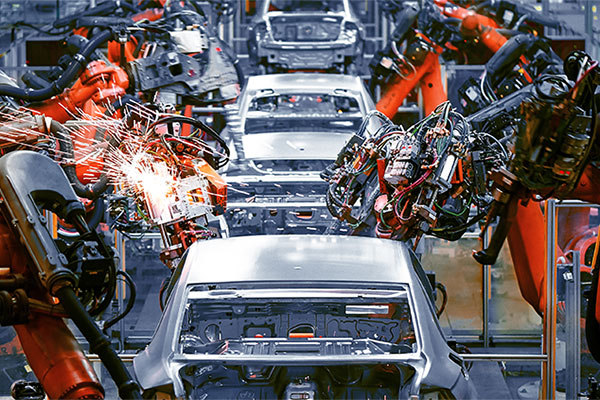Manufacturing, any industry that makes products from raw materials by the use of manual labour or machinery and that is usually carried out systematically with a division of labour. (See industry.) In a more limited sense, manufacturing denotes the fabrication or assembly of components into finished products on a fairly large scale. Among the most important manufacturing industries are those that produce aircraft, automobiles, chemicals, clothing, computers, consumer electronics, electrical equipment, furniture, heavy machinery, refined petroleum products, ships, steel, and tools and dies.

automobile assembly line
Division of labour
Division of labour, the separation of a work process into a number of tasks, with each task performed by a separate person or group of persons. It is most often applied to systems of mass production and is one of the basic organizing principles of the assembly line. Breaking down work into simple repetitive tasks eliminates unnecessary motion and limits the handling of different tools and parts. The consequent reduction in production time and the ability to replace craftsmen with lower-paid unskilled workers result in lower production costs and a less expensive final product. Contrary to popular belief, however, division of labour does not necessarily lead to a decrease in skills—known as proletarianization—among the working population. The Scottish economist Adam Smith saw this splitting of tasks as a key to economic progress by providing a cheaper and more efficient means of producing goods.

assembly line: automobile
The French scholar Émile Durkheim first used the phrase division of labour in a sociological sense in his discussion of social evolution. Rather than viewing division of labour as a consequence of a desire for material abundance, Durkheim stated that specialization arose from changes in social structure caused by an assumed natural increase in the size and density of population and a corresponding increase in competition for survival. Division of labour functioned to keep societies from breaking apart under these conditions.
The intensive specialization in industrial societies—the refinement and simplification of tasks (especially associated with a machine technology) so that a worker often produces only a small part of a particular commodity—is not usually found in nonindustrialized societies. There is rarely a division of labour within an industry in nonliterate communities, except perhaps for the production of larger goods (such as houses or canoes); in these cases the division is often a temporary one, and each worker is competent to perform other phases of the task. There may be some specialization in types of products (e.g., one worker may produce pottery for religious uses; another, pottery for ordinary uses), but each worker usually performs all steps of the process.
A division of labour based on sex appears to be universal, but the form that this takes varies widely across cultures. Divisions on the basis of age, clan affiliation, hereditary position, or guild membership, as well as regional and craft specialization, are also found.



Comments are closed